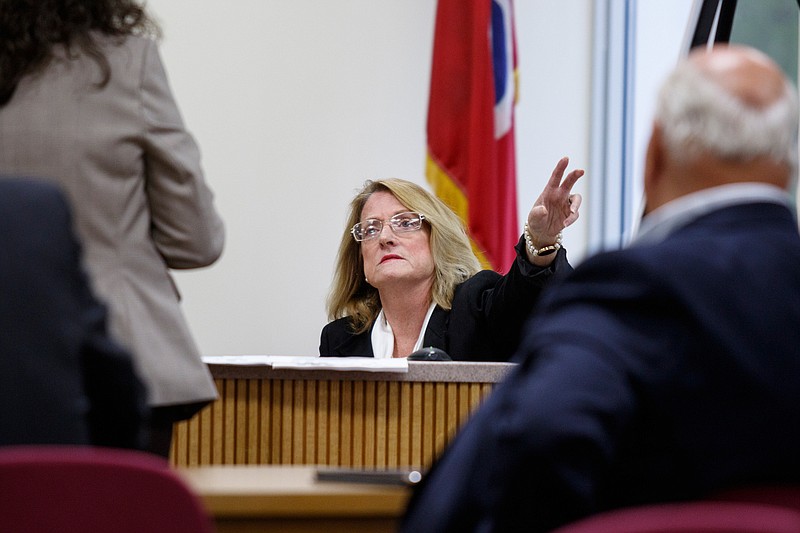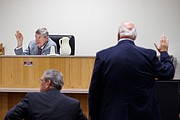A special judge dismissed Tuesday a claim by a candidate for a Hamilton County judgeship who says a man she hired to put out political campaign signs failed to live up to their agreement.
Judge Thomas Austin, of Sequatchie County General Sessions Court, listened to about three hours of trial testimony and seemed to sympathize with family attorney Catherine White's claim against businessman John Shackleford but ultimately concluded she didn't "carry her burden of proof." Austin heard the case because local judges also have used Shackleford in campaigns and recused themselves.
White, a family attorney, filed a civil summons against Shackleford this summer in Hamilton County General Sessions Court, saying Shackleford had agreed on Feb. 11 to place 150 signs around Chattanooga for $15 each in her bid for Hamilton County Circuit Court judge. Instead, he installed only 112, White said, which is proven by a "bubble map" that Shackleford created showing the general location of each sign. In her claim, she said Shackleford owed her $2,040.92.
White testified Tuesday that she had problems with her signs throughout her campaign, including Easter weekend when she and her family drove around noting missing political signs or fixing others that were in shoddy condition. She ultimately lost the May 1 Republican primary to opponent and current Circuit Court Judge Kyle Hedrick. During the examinations, White said she noticed a lower number of signs and tried unsuccessfully to get Shackleford to give her a list of all the addresses where she had signs.
Shackleford and his attorney, Hal North, retorted that it's common in every political campaign for signs to be destroyed by weather, vandalism, vehicles and municipalities who oversee strict right-of-way rules. Shackleford, who has placed signs for nearly two decades and previously estimated he was working on 11 campaigns, testified Tuesday that he sent White a screenshot of the "bubble map" but that it didn't represent everywhere he put a sign. For example, Shackleford said, he held 11 signs in reserve for early voting. And North added that dots on the "bubble map" were so close, one dot may count for two signs that are placed on opposite or nearby intersections.
Shackleford said he didn't have the right software at the time to be able to provide White with more specific information. He does now, he testified Tuesday.
Austin suggested Shackleford "probably made a mistake" not sitting down with his customer and explaining where he placed each sign. He noted Shackleford also opened himself up to possible liability by representing multiple campaigns, including White's opponent, Hedrick. But ultimately, the case boiled down to "he-said, she-said," Austin ruled, and White didn't prove her case.
After the trial, White said she planned to appeal Austin's ruling.
"An appeal will entail subpoenaing other candidates who have had troubled dealings with the defendant in the past," White said. "I did not want to go there for the sake of the Republican Party at this level, but will bring other candidates in should I decide to appeal. They will be able to testify about the defendant's character and business practices."
Contact staff writer Zack Peterson at zpeterson@timesfreepress.com or 423-757-6347. Follow him on Twitter @zackpeterson918.

